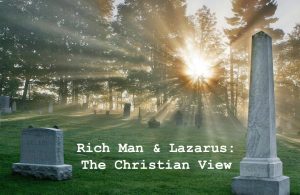 One of the primary passages that teaches a conscious existence after death and refutes the Watchtower’s annihilation-of-the-wicked doctrine is Jesus’ account of the rich man and Lazarus in Luke 16:19-31. Here is how that passage reads in the Revised Standard Version:
One of the primary passages that teaches a conscious existence after death and refutes the Watchtower’s annihilation-of-the-wicked doctrine is Jesus’ account of the rich man and Lazarus in Luke 16:19-31. Here is how that passage reads in the Revised Standard Version:
19 “There was a rich man, who was clothed in purple and fine linen and who feasted sumptuously every day. 20 And at his gate lay a poor man named Lazarus, full of sores, 21 who desired to be fed with what fell from the rich man’s table; moreover the dogs came and licked his sores. 22 The poor man died and was carried by the angels to Abraham’s bosom. The rich man also died and was buried; 23 and in Hades, being in torment, he lifted up his eyes, and saw Abraham far off and Lazarus in his bosom.
24 And he called out, `Father Abraham, have mercy upon me, and send Lazarus to dip the end of his finger in water and cool my tongue; for I am in anguish in this flame.’ 25 But Abraham said, `Son, remember that you in your lifetime received your good things, and Lazarus in like manner evil things; but now he is comforted here, and you are in anguish. 26 And besides all this, between us and you a great chasm has been fixed, in order that those who would pass from here to you may not be able, and none may cross from there to us.’
27 And he said, `Then I beg you, father, to send him to my father’s house, 28 for I have five brothers, so that he may warn them, lest they also come into this place of torment.’ 29 But Abraham said, `They have Moses and the prophets; let them hear them.’ 30 And he said, `No, father Abraham; but if some one goes to them from the dead, they will repent.’ 31 He said to him, `If they do not hear Moses and the prophets, neither will they be convinced if some one should rise from the dead.'”
To the Christian, Jesus’ story establishes the following:
- Physical death is not the end of our existence.
- When people die physically, they continue to have thoughts and emotions.
- Some people who die experience paradise.
- Some people who die experience torment and anguish comparable to a thirst that is never quenched.
- There is no second chance for salvation after death.
- People who experience torment and anguish after death want people they care about to repent before they die in order to avoid the place of torment.
- The dead cannot communicate with the living.
- The way of salvation is set out in the Bible.
Because Ecclesiastes 9:5 says that “the dead know nothing,” the Watchtower concludes that Jesus’ account of the rich man and Lazarus can’t really be about two men who actually died, remained conscious after death, and experienced either paradise or torment.
It attempts to escape the plain meaning of Jesus’ words by ridiculing a straw man interpretation of the passage.
“If taken literally,” the Watchtower says, “Jesus’ story “would mean that those enjoying divine favor could all fit into the bosom of one man, Abraham; that the water on one’s fingertip would not be evaporated by the fire of Hades; that a mere drop of water would bring relief to one suffering there. Does that sound reasonable to you? If it were literal, it would contradict other parts of the Bible. If the Bible were thus contradictory, would a lover of truth use it as the basis for his faith? But the Bible does not contradict itself.” (Reasoning from the Scriptures, pp. 174-175)
Having thus debunked a completely literal meaning for every word and phrase—an interpretation that no responsible scholar espouses—the Watchtower then goes to the opposite extreme and insists that Jesus’ story is nothing more than a parable which is an allegory about a reversal of fortunes in this life.
We will examine the Watchtower’s explanation of the rich man and Lazarus in the next post.
Your turn:
Have you ever discussed the rich man and Lazarus account with Jehovah’s Witnesses? How did it go?
Share your thoughts in the comments.

Leave a Reply
Be the First to Comment!